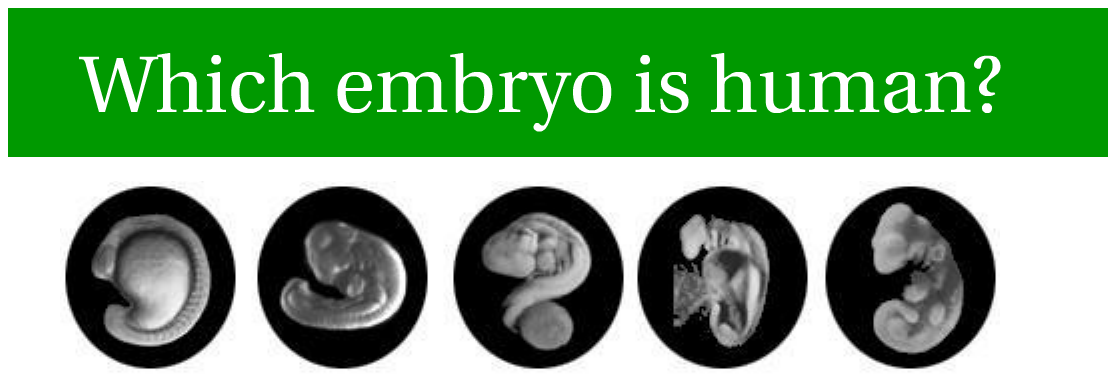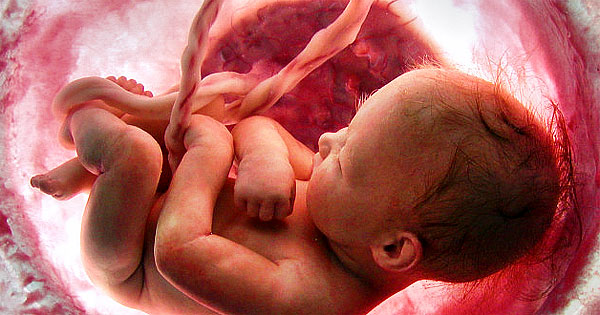Last January I had a discussion on Facebook in which the person with whom I was speaking made the bold claim that the unborn “aren’t human yet”. An interesting assertion! I responded with two questions:
Question #1: “What kind of offspring do human parents have?”
Question #2: “What do you call an organism with human DNA?”
Of course, the answer to both of these questions is “human”. Unfortunately, my friend chose to ignore both of these questions, so I asked another:
“If a fetus in his mother’s womb isn’t human…what is he? To what species does he then belong?”
Once again, this question went answered. To assert that the unborn aren’t human requires that they be something else. I asked repeatedly what that “something else” was, but I never got an answer…
The Line Up
Eventually, my friend posted the following image:

From left-to-right, this picture shows embryos from different species: zebrafish, chicken, dog, human and skink. Although he didn’t articulate it, it appeared that he thought that being unable to visually identify the human fetus somehow proved that the it wasn’t human.
This is, of course, terrible logic. If I don’t know the answer to a question on a quiz show, does that mean that no answer exists? Of course not, it just means that I don’t have the right information at my fingertips.
 There are lots of things which aren’t easy to identify with the naked eye. An unmarked bottle of sulfuric acid (H2SO4) can look very similar to a bottle of water (H20). If I placed an unmarked bottle of each liquid in front of you, would a visual inspection be enough to convince you to take a drink from one of them? Of course not! What would need to happen in order to make you drink with confidence? You’d want to run more conclusive tests than a simple visual inspection.
There are lots of things which aren’t easy to identify with the naked eye. An unmarked bottle of sulfuric acid (H2SO4) can look very similar to a bottle of water (H20). If I placed an unmarked bottle of each liquid in front of you, would a visual inspection be enough to convince you to take a drink from one of them? Of course not! What would need to happen in order to make you drink with confidence? You’d want to run more conclusive tests than a simple visual inspection.
In the same way, just because I can’t easily see from an image whether or not a fetus is a human fetus, doesn’t change the fetus’ species. It’s true that the naked eye can’t easily give you the answer to that question, but appropriate scientific examination can! In this case, a simple DNA test could give you a conclusive answer as to the species of each of the above embryos.
Biologically speaking, it is impossible to declare that the unborn are anything less than human. If they are indeed human, it would follow that, as such, even the unborn should be treated with respect and dignity.
 I am currently in the middle of Trent Horn‘s latest book, Hard Sayings. In his book, he spends some time discussing the objections raised by critics of the Bible as they interpret Genesis’ account of creation. Just as I was finishing this section of the book, my friend Len shared the following video his Facebook wall:
I am currently in the middle of Trent Horn‘s latest book, Hard Sayings. In his book, he spends some time discussing the objections raised by critics of the Bible as they interpret Genesis’ account of creation. Just as I was finishing this section of the book, my friend Len shared the following video his Facebook wall:
 I’ve got a longer article in progress on the subject of abortion, but today’s post is an extremely short entry on a point I’ve been wanting to mention for some time…
I’ve got a longer article in progress on the subject of abortion, but today’s post is an extremely short entry on a point I’ve been wanting to mention for some time…




 There are lots of things which aren’t easy to identify with the naked eye. An unmarked bottle of sulfuric acid (H2SO4) can look very similar to a bottle of water (H20). If I placed an unmarked bottle of each liquid in front of you, would a visual inspection be enough to convince you to take a drink from one of them? Of course not! What would need to happen in order to make you drink with confidence? You’d want to run more conclusive tests than a simple visual inspection.
There are lots of things which aren’t easy to identify with the naked eye. An unmarked bottle of sulfuric acid (H2SO4) can look very similar to a bottle of water (H20). If I placed an unmarked bottle of each liquid in front of you, would a visual inspection be enough to convince you to take a drink from one of them? Of course not! What would need to happen in order to make you drink with confidence? You’d want to run more conclusive tests than a simple visual inspection.
